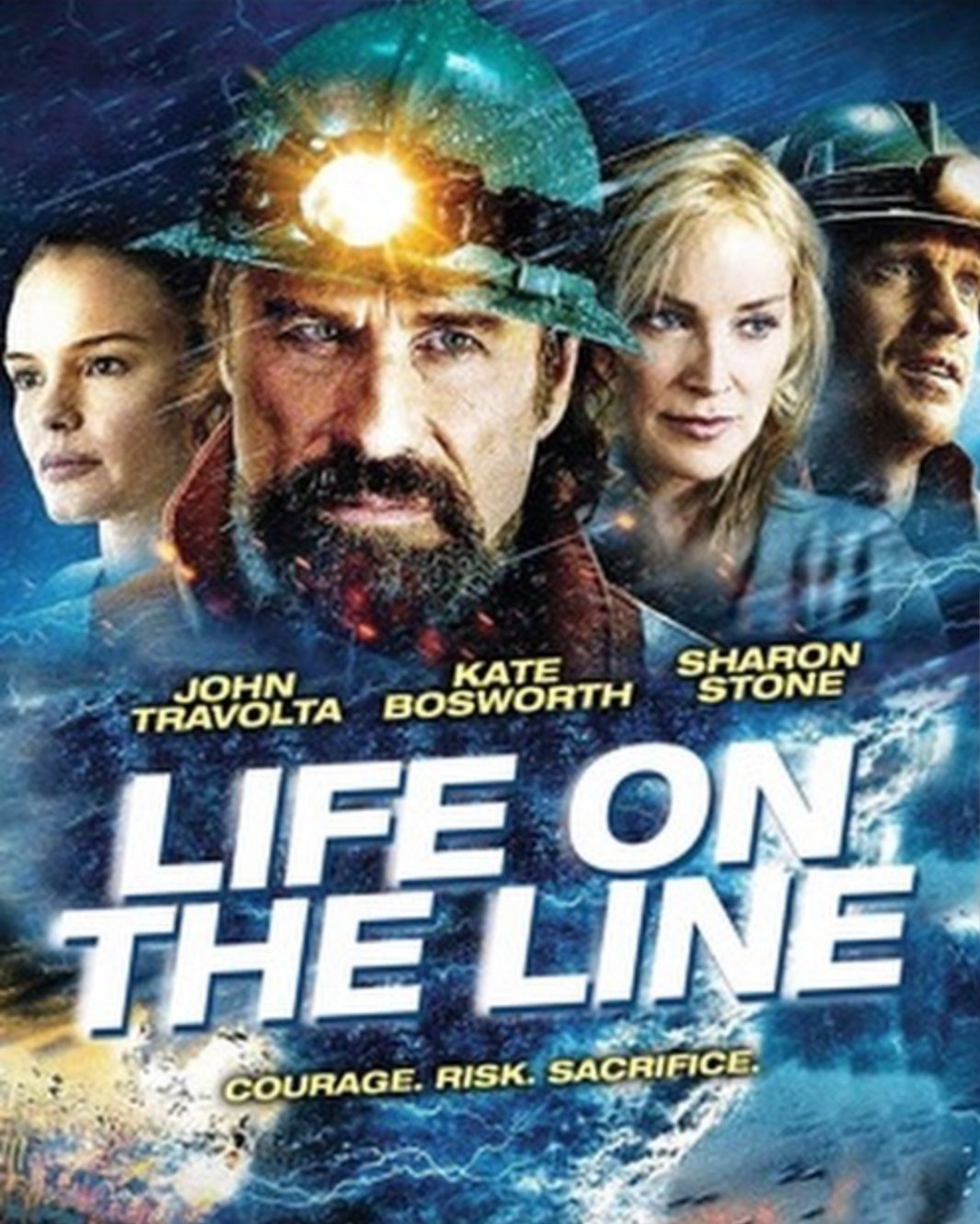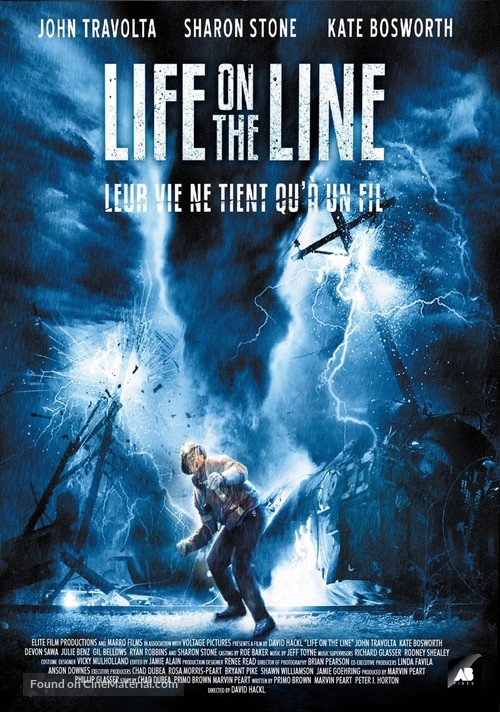John Travolta's Sleepy Linemen Drama Life on the Line Drama is a Real Zero in More Ways Than Anyone
The Travolta/Cage Project is an ambitious, years-long multi-media exploration of the fascinating, overlapping legacies of Face/Off stars John Travolta and Nicolas Cage with two components: this online column exploring the actor’s complete filmographies in chronological order and the Travolta/Cage podcast, where Clint Worthington, myself and a series of fascinating guests discuss the movies I write about here.
Read previous entries in the column here, listen to the podcast here, pledge to the Travolta/Cage Patreon at this blessed web address and finally follow us on Twitter at https://twitter.com/travoltacage
When I was laid off from The Dissolve in April of 2015, Rotten Tomatoes threw me a lifeline by commissioning a pair of ongoing columns that they ended up running infrequently and sporadically before cancelling unceremoniously.
When I entered into negotiations with Rotten Tomatoes I was told that they were trying re-brand. They wanted to create more original content so that they would be seen as something more than just an aggregator for reviews.
I had a name and a reputation at the time. I was flattered that a site as big and popular as Rotten Tomatoes not only wanted to work with me but wanted to pay me way too much money as well.
My primary column for them initially was The Simpsons Decade. The Simpsons Decade began as a book proposal rooted in my obsession with 1990s comedy. The idea behind The Simpsons Decade was that the 1990s marked an unprecedented era of peace and prosperity in American life and American pop culture. The Cold War was over. We were triumphant. Computers were going to change everything and make our lives giddy cyber-paradises.
Things were so peachy that the preeminent satirists of the day stopped turning their attention to religion and sex and politics and hypocrisy and looked instead to the single most important factor in American life: television.
The Simpsons Decade was about how self-referential, post-modern satire rooted in our culture-wide addiction to television became the preeminent form of comedy in the 1990s.
Looking back, I have absolutely no idea why Rotten Tomatoes would go for an idea like that. It would be an abstract, academic and intellectual conceit for a book published by a University press. It makes absolutely no sense on a site that people visit because they want to know whether or not critics liked The Super Mario Brothers Movie.
Rotten Tomatoes had no idea how to package, brand or promote The Simpsons Decade. So for a difficult year or so entries would be released sporadically before I got the inevitable email that they were cancelling the series.
I had another column on cult movies at the time called Sub-Cult that was less academic but not necessarily any more popular.
Rotten Tomatoes wanted me to write My World of Flops for them but I didn’t think The A.V. Club would be cool with that so for my final Rotten Tomatoes column, I came up with a nifty idea specifically for the site.
I would go back through Rotten Tomatoes’ archive and write about all of the movies that received the dreaded “Zero” rating, meaning that not a single critic deemed legitimate by Rotten Tomatoes gave it a positive score.
I figured that if any column idea had a chance of succeeding at Rotten Tomatoes it would be The Zeroes but it didn’t take long for them to lose interest and put the column on indefinite hiatus.
The column isn’t technically dead, but I also haven’t written a new entry in at least five years. I didn’t write up many entries for The Zeroes but the ones I did tended to feature John Travolta.
I wrote up Staying Alive and Look Who’s Talking Now and finally Life on the Line for The Zeroes. I think I gave them the option of Gottti and Life on the Line and they chose Life on the Line because it was less over-exposed.
That is true, I suppose, in the sense that Life on the Line was completely obscure. I had no idea it existed and I was only a few years away from embarking on a project where I watched and wrote about ALL of John Travolta’s films.
It’s easy to see why Life on the Line made no cultural impact whatsoever. It doesn’t feel like a proper motion picture so much as a failed pilot of a CW drama about the sexy, soulful blue-collar hunks who put their lives on the line every day to make sure the power grid is intact so everything can run smoothly.
Life on the Line opens, confusingly, with a talking head segment involving Duncan (Devon Sawa) discussing his life as a lineman and the the deadly, destructive storm at the film’s core.
There are one or two more faux-documentary moments throughout the film but otherwise Life on the Line forgets that it’s a mockumentary or a docudrama or anything other than a bunch of testosterone-poisoned hooey.
We then segue to a prelude chronicling how a lineman named Danny Ginner (Ty Olson) lost his life on the job one bleak, awful, rainy night. In a deeply unfortunate turn of events, Danny’s wife and the mother of his daughter Bailey (Kate Bosworth) dies in a fatal car accident the same terrible evening her husband is roasted like a marshmallow at a campfire by an errant blast of lightning.
We then fast-forward fifteen years. Bailey is now a twenty-three year old waitress living with her Uncle Beau (John Travolta), who is head lineman and very protective of his deeply traumatized niece.
So when Duncan (Travolta’s future The Fanatic nemesis Devon Saws in a less iconically terrible role/film) takes an interest in Beau’s beautiful niece, he is less than overjoyed. It’s almost as if he will have to make a dramatic, climactic display of heroism to prove himself in the other man’s eyes.
Duncan’s drunken, burn out mother (Sharon Stone) is even less impressed by the handsome young lineman. When he tells her that he’s a lineman she blearily, boozily and not at all helpfully reminds him that his father was a lineman, and he fucking died on the job like a total fucking loser and why on earth would anyone want a job like that?
Stone makes quite an impression in her five minutes onscreen as the mom from hell. They aren’t positive. She seems to have followed the Shelley Winters path from sexy bombshell to scenery-devouring ham.
Life on the Line follows the dreary, dishwater grey lead-up to a storm the film never stops teasing as the glorious climax that will be the film’s redemption. When the storm hits, however, it’s more like a drizzle, albeit with the requisite melodrama and casualties.
The storm in Life on the Line is like the Storm of Q mythology: a colossal disappointment. The filmmakers have deluded themselves into thinking that the lives of linemen are inherently dramatic and cinematic and begging to be dramatized on the big screen.
It’s easy to see why. Linemen are legitimately heroes who risk their lives for our comfort and safety. They could die on the job any day. It’s apparently the fourth most dangerous job in the world.
That’s not how it plays out, however. Watching men with unflattering facial hair in bright orange garb trying to fix things in the rain is nowhere near as dynamic or exciting as the film seems to think.
Life on the Line shines a heroic spotlight on overlooked heroes but the linemen and women of the world deserves better than this empty, achingly dull celebration of their lives and careers.
Failure, Fiasco or Secret Success: Failure
Check out my newest literary endeavor, The Joy of Trash: Flaming Garbage Fire Extended Edition at https://www.nathanrabin.com/shop and get a free, signed "Weird Al” Yankovic-themed coloring book for free! Just 18.75, shipping and taxes included! Or, for just 25 dollars, you can get a hardcover “Joy of Positivity 2: The New Batch” edition signed (by Felipe and myself) and numbered (to 50) copy with a hand-written recommendation from me within its pages. It’s truly a one-of-a-kind collectible!
Or you can buy The Joy of Trash from Amazon at https://www.amazon.com/Joy-Trash-Nathan-Definitive-Everything/dp/B09NR9NTB4/ref=tmm_pap_swatch_0?_encoding=UTF8&qid=&sr= but why would you want to do that?
Pre-order The Fractured Mirror, the Happy Place’s next book, a 600 page magnum opus about American films about American films illustrated by the great Felipe Sobreiro over at https://the-fractured-mirror.backerkit.com/hosted_preorders
Check out my new Substack at https://nathanrabin.substack.com/
And we would love it if you would pledge to the site’s Patreon as well. https://www.patreon.com/nathanrabinshappyplace










